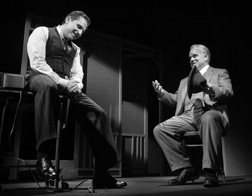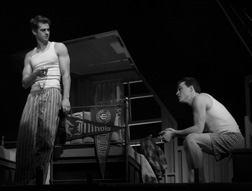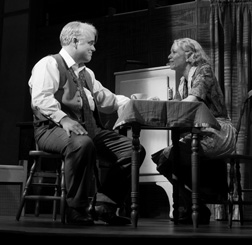By Lucy Komisar
The house in Brooklyn seems ramshackle. Willy Loman (Philip Seymour Hoffman) enters it slowly, wearily, pushing through the dreary light, carrying two leather cases that seem weighted down more with his angst than with anything he could be carrying. It is Hoffman‘s best moment in the play. For the rest, he portrays Loman too much on one note, in a voice too raucous that doesn‘t quite give us the sense of tragedy Arthur Miller intended. Or maybe I‘m remembering the superb Brian Dennehy in the role in 1999. And director Mike Nichols has put together a cast that doesn’t quite come together. Though he certainly evokes the past — with a copy of the original set and even in the black and white production photos provided to critics.

Still, Miller‘s 1949 indictment of capitalism is powerful. And this play has its place in the canon of American theater and deserves to be seen. We squirm as we watch Howard Wagner (Remy Auberjonois), the heartless boss in blue pin stripes. A few decades younger than Loman, he inherited the garment company that has sent Willy on the road as a traveling salesman for 36 years and has now taken away his salary and left him to work on commission — not enough to pay the bills. Auberjonois does a good job of portraying a fellow who was born with a silver spoon in his mouth and assumes that Loman must enjoy the same privileges. It‘s a performance that resonates today. (Don‘t we all belong to country clubs?)
Loman is 60, and his own kids, in their 30s, haven‘t had those advantages. But you get the sense that it‘s not just money they lacked, but a compassionate dad with values. Loman would be Wagner if he could be.
Son Biff (Andrew Garfield), works on a farm, has worked on ranches, doesn‘t know what to do with himself, feels he’s wasted his life. His hates business. He wants a ranch, to do the work he likes and still be someone. He started out as someone, a star high school athlete (you don‘t get that sense from Garfield‘s portrayal), but then something happened and he didn‘t go to college. His father calls him a lazy bum.

Hap (Finn Wittrock in a rather hokey portrayal) is waiting for the merchandise manager a rank above him to die, but he doesn‘t know what he’s working for. He’s lonely. And he is crass. He brags that he beds the fiancées of executives and then goes to their weddings — or is that a lie? Hap keeps saying he’s going to get married. Willy and his wife Linda (Linda Emond) ignore him.
Not that the system can‘t work. Their cousin Bernard (Fran Kranz) is a serious student (Kranz plays the youth as too much of a cartoon) and will make something of himself — a fancy lawyer, it turns out. (Where did they get that old wooden tennis racquet he packs for a trip to Washington to argue before the Supreme Court?) His later demeanor and that of his father give credence to the notion that the play is about Jews, though there‘s no other reference.
But the system won‘t work for the Loman males, because they live in fantasies of the past or what might have been. What links all the Loman men is that they are delusional. Willy taught his sons to lie about themselves and to themselves.
He wants to project greatness to Biff, but his temper is explosive. We learn later of a secret that must have engulfed the father in guilt towards his son, for the son’s failure. The hostility between father and sons makes it more ironic that Willy insists that he’s well-liked by the people who he deals with on the road. He later he admits that people don‘t take to him.
There‘s a rather weird fantasy bit with his long-lost adventurous (made a killing in Alaska) brother which I couldn‘t quite figure out. The fantasy grab for success?

The only one with a sense of reality is wife Linda. Emond portrays her distress at her husband‘s disintegration subtly and masterfully. She has perfect pitch; in fact, it‘s better than anyone else‘s in the play.
Interesting that Miller, a known critic of capitalism, has here made the point that it‘s not only the system that does people in — they weren‘t born Wagners — it‘s also their own failings and their belief in the system. This play in 1949 was quite extraordinary. Maybe we need a new version.
“Death of a Salesman. Written by Arthur Miller; directed by Mike Nichols. Ethel Barrymore Theatre, 243 West 47th Street, New York City. 212-239-6200. Opened March 15, 2012; closes June 2, 2012.


yes
I recently thought about this film (and indeed the play, of course) with respect to my own life, having recently listened to the Mark Maron podcast, where Jeff Goldblum (having played Biff in a theatre production) asserted that Biff is undergoing a mid life crisis; something that I couldn’t quite empathise with when I first encountered the play in high school, at the tender age of 15.
I actually remember the film as being good – I enjoyed the ‘fourth wall busting’ motif of the camera rising up to reveal a theatre set. A dark conceit that David Lynch used in Inland Empire.
I always used to think the play was a meditation on failure, which it is to some extent, and it was only recently that it ocurred to me that it is indeed a critique on capitalism, and how it chews up and spits people out, and fails to deliver on its own promise.
The recurring motif with his cousin Ben, and his offer of opportunity questing for wealth in Africa (“The jungle is dark, but full of diamonds”) is one of the play’s most haunting motifs to me, and seems to represent Willy’s sense of failure in recognising opportunity (and grasping it) when it was presented to him, on a plate.
Biff, as a character is deemed a failure by his father, the tortured Willy, but ultimately, despite his flaws, is only one who finds any true redemption, by taking responsibility for his own happiness (at the cost of his own father’s respect) and renouncing the pitiless machine his father was a cog in. And in this sense I agree with you: for Willy’s pursuit of his idealised notion of success is ultimately a mirage, and the fulcrum of his own destruction.